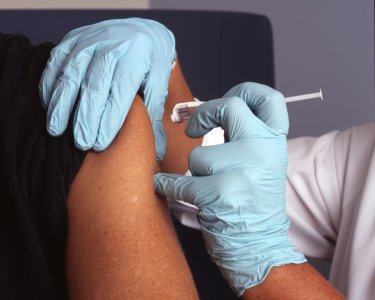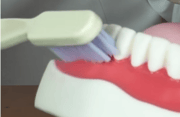Unexpected link: Could this simple health step support your brain as you age?
- Replies 0
Disclaimer: The information provided in this article is for educational purposes only and is not intended as a substitute for professional medical advice, diagnosis, or treatment. Always consult your physician or other qualified healthcare providers with any questions you may have regarding a medical condition or before making any changes to your health regimen.
As we grow older, it’s natural to become more aware of the changes in both our bodies and minds. Cognitive decline, including conditions like dementia, remains a serious concern for many.
But recent research is shedding light on an unexpected connection—suggesting that a common preventive measure, long known for its role in managing a painful condition, may also offer unexpected benefits for brain health.
Could this be a quiet breakthrough in supporting healthy aging?
“Shingles is a terrible, painful and debilitating condition that can lead to horrendous long-term pain,” shared Dr. Aarati Didwania, a professor of medicine and medical education at Northwestern University’s Feinberg School of Medicine in Chicago.
Shingles, also known as herpes zoster, is a condition that can emerge years after an initial infection with the varicella-zoster virus—the same virus that causes chickenpox. Characterized by a painful rash and blisters, shingles can have debilitating effects, particularly in older adults.
But the impact of the varicella-zoster virus may extend beyond the skin's surface.
A new study is raising eyebrows for more than one reason. Researchers now suggest that getting the shingles vaccine might not only prevent a painful illness but could also be linked to a lower chance of developing dementia.

Published in Nature, the study looked at health data from over 280,000 older adults in Wales. It found that those who had received the older live-virus shingles vaccine were 20% less likely to be diagnosed with any type of dementia compared to those who hadn't been vaccinated.
Previous findings have already hinted at a similar trend with the newer Shingrix vaccine, introduced in 2020, especially in women. But those results weren’t considered conclusive since it was difficult to control for health differences between vaccinated and unvaccinated individuals.
Shingrix, which contains a piece of viral DNA instead of the full virus, has shown stronger and longer-lasting effects.
This latest study benefitted from an unusual rollout strategy in Wales, which allowed scientists to observe a near “natural experiment.”
On September 1, 2013, the vaccine was offered only to people who were exactly 79 years old that day — not to those who had just turned 80. This allowed researchers from Germany and Stanford University to compare two nearly identical groups of people — separated by just one week in age — where only one group had access to the vaccine.
“It’s essentially like a randomized controlled trial,” said Dr. Pascal Geldsetzer of Stanford University, who led the research.
Dr. Allison Aiello, a professor at Columbia University’s Aging Center who wasn’t involved in the study, agreed the setup offered a strong way to test the vaccine’s potential impact.
“It’s like having a control group compared to a treated group,” she said. “What’s interesting is the finding of 20% protection. That is a pretty strong effect.”

Experts don’t fully understand how the chickenpox virus might increase dementia risk.
According to Dr. Geldsetzer, the virus can become reactivated and may contribute to the buildup of proteins linked to conditions like Alzheimer’s. It might also reactivate other viruses, such as herpes simplex, which previous studies have connected to dementia.
Herpes viruses don’t disappear after initial infection — they remain dormant until the immune system weakens. As people age, this weakening allows viruses like varicella zoster to reemerge in the form of shingles.
Because of this age-related risk, the shingles vaccine in the U.S. is recommended for people 50 and older. It is given in two doses spaced a few months apart.
You might be interested: Are antidepressants affecting dementia risk? What you need to know
Some experts have pointed out that herpes viruses can sometimes make their way into the brain. That includes herpes simplex viruses, which can cause both oral and genital herpes.
One recent study published in 2024 found that older adults diagnosed with herpes simplex were more than twice as likely to develop dementia over a 15-year period compared to those without the infection.
When herpes simplex enters the brain, it can cause serious problems such as encephalitis and meningitis—both potentially life-threatening conditions.
Supporting the idea that shingles vaccines may have additional benefits, a 2024 study published in Nature Medicine involving 100,000 patients also suggested that people who received the newer shingles vaccine had an even lower risk of dementia.
Source: Dementia Careblazers / Youtube.
That same research looked at whether other common vaccines — such as those for influenza or Tdap (tetanus, diphtheria, and pertussis) — offered similar protection. They didn’t show the same results.
Dr. Aarati Didwania from Northwestern University’s Feinberg School of Medicine said the new study points to an encouraging trend: “The most important take-home message... is that getting vaccinated might lower the risk for dementia.”

The exact mechanism isn’t fully known. “But it’s an intriguing question,” Didwania added. “Is it by decreasing inflammation or preventing the virus from reactivating?”
Dr. Didwania noted there are already strong reasons to consider the vaccine. “Shingles is a terrible, painful and debilitating condition that can lead to horrendous long-term pain,” she said.
Also read: Even the biggest skeptics are rethinking Measles vaccines—here’s why one major figure is urging action
Still, the study has its limitations. It’s not the same as a traditional randomized clinical trial, emphasized Dr. William Schaffner from Vanderbilt University. But assigning people to skip a proven vaccine wouldn’t be ethical, he said.
Dr. Schaffner described the findings as “provocative, interesting and exciting.” He added that the Food and Drug Administration could, in time, consider whether shingles vaccines should be officially labeled for dementia prevention based on future research.
Even if no label change happens, the study may help doctors explain the broader potential benefits of shingles vaccination to their patients.
“Clearly there are lots of people 50 and over who have not received the vaccine,” Schaffner said. “If you say there are some data that suggest the vaccine might prevent some cases of dementia, people might be persuaded.”
Read next: Scientists reveal a 5-minute daily habit that could slash your dementia risk!

Have you or a loved one been affected by shingles or dementia? Are you considering the shingles vaccine for its potential cognitive benefits? Share your thoughts, experiences, and questions in the comments below!
As we grow older, it’s natural to become more aware of the changes in both our bodies and minds. Cognitive decline, including conditions like dementia, remains a serious concern for many.
But recent research is shedding light on an unexpected connection—suggesting that a common preventive measure, long known for its role in managing a painful condition, may also offer unexpected benefits for brain health.
Could this be a quiet breakthrough in supporting healthy aging?
“Shingles is a terrible, painful and debilitating condition that can lead to horrendous long-term pain,” shared Dr. Aarati Didwania, a professor of medicine and medical education at Northwestern University’s Feinberg School of Medicine in Chicago.
Shingles, also known as herpes zoster, is a condition that can emerge years after an initial infection with the varicella-zoster virus—the same virus that causes chickenpox. Characterized by a painful rash and blisters, shingles can have debilitating effects, particularly in older adults.
But the impact of the varicella-zoster virus may extend beyond the skin's surface.
A new study is raising eyebrows for more than one reason. Researchers now suggest that getting the shingles vaccine might not only prevent a painful illness but could also be linked to a lower chance of developing dementia.

New research suggests that getting vaccinated against shingles may also offer protection against dementia. Image source: National Cancer Institute / Unsplash.
Published in Nature, the study looked at health data from over 280,000 older adults in Wales. It found that those who had received the older live-virus shingles vaccine were 20% less likely to be diagnosed with any type of dementia compared to those who hadn't been vaccinated.
Previous findings have already hinted at a similar trend with the newer Shingrix vaccine, introduced in 2020, especially in women. But those results weren’t considered conclusive since it was difficult to control for health differences between vaccinated and unvaccinated individuals.
Shingrix, which contains a piece of viral DNA instead of the full virus, has shown stronger and longer-lasting effects.
This latest study benefitted from an unusual rollout strategy in Wales, which allowed scientists to observe a near “natural experiment.”
On September 1, 2013, the vaccine was offered only to people who were exactly 79 years old that day — not to those who had just turned 80. This allowed researchers from Germany and Stanford University to compare two nearly identical groups of people — separated by just one week in age — where only one group had access to the vaccine.
“It’s essentially like a randomized controlled trial,” said Dr. Pascal Geldsetzer of Stanford University, who led the research.
Dr. Allison Aiello, a professor at Columbia University’s Aging Center who wasn’t involved in the study, agreed the setup offered a strong way to test the vaccine’s potential impact.
“It’s like having a control group compared to a treated group,” she said. “What’s interesting is the finding of 20% protection. That is a pretty strong effect.”

Analysis of data from over 280,000 older adults showed that those vaccinated with the original shingles vaccine were less likely to develop dementia. Image source: Sarandy Westfall / Unsplash.
Experts don’t fully understand how the chickenpox virus might increase dementia risk.
According to Dr. Geldsetzer, the virus can become reactivated and may contribute to the buildup of proteins linked to conditions like Alzheimer’s. It might also reactivate other viruses, such as herpes simplex, which previous studies have connected to dementia.
Herpes viruses don’t disappear after initial infection — they remain dormant until the immune system weakens. As people age, this weakening allows viruses like varicella zoster to reemerge in the form of shingles.
Because of this age-related risk, the shingles vaccine in the U.S. is recommended for people 50 and older. It is given in two doses spaced a few months apart.
You might be interested: Are antidepressants affecting dementia risk? What you need to know
Some experts have pointed out that herpes viruses can sometimes make their way into the brain. That includes herpes simplex viruses, which can cause both oral and genital herpes.
One recent study published in 2024 found that older adults diagnosed with herpes simplex were more than twice as likely to develop dementia over a 15-year period compared to those without the infection.
When herpes simplex enters the brain, it can cause serious problems such as encephalitis and meningitis—both potentially life-threatening conditions.
Supporting the idea that shingles vaccines may have additional benefits, a 2024 study published in Nature Medicine involving 100,000 patients also suggested that people who received the newer shingles vaccine had an even lower risk of dementia.
Source: Dementia Careblazers / Youtube.
That same research looked at whether other common vaccines — such as those for influenza or Tdap (tetanus, diphtheria, and pertussis) — offered similar protection. They didn’t show the same results.
Dr. Aarati Didwania from Northwestern University’s Feinberg School of Medicine said the new study points to an encouraging trend: “The most important take-home message... is that getting vaccinated might lower the risk for dementia.”

The rollout of the vaccine in Wales allowed for a comparison between similar age groups, providing strong evidence for the vaccine's protective effect against dementia. Image source: Robina Weermeijer / Unsplash.
The exact mechanism isn’t fully known. “But it’s an intriguing question,” Didwania added. “Is it by decreasing inflammation or preventing the virus from reactivating?”
Dr. Didwania noted there are already strong reasons to consider the vaccine. “Shingles is a terrible, painful and debilitating condition that can lead to horrendous long-term pain,” she said.
Also read: Even the biggest skeptics are rethinking Measles vaccines—here’s why one major figure is urging action
Still, the study has its limitations. It’s not the same as a traditional randomized clinical trial, emphasized Dr. William Schaffner from Vanderbilt University. But assigning people to skip a proven vaccine wouldn’t be ethical, he said.
Dr. Schaffner described the findings as “provocative, interesting and exciting.” He added that the Food and Drug Administration could, in time, consider whether shingles vaccines should be officially labeled for dementia prevention based on future research.
Even if no label change happens, the study may help doctors explain the broader potential benefits of shingles vaccination to their patients.
“Clearly there are lots of people 50 and over who have not received the vaccine,” Schaffner said. “If you say there are some data that suggest the vaccine might prevent some cases of dementia, people might be persuaded.”
Read next: Scientists reveal a 5-minute daily habit that could slash your dementia risk!
Key Takeaways
- New research suggests that getting vaccinated against shingles may also offer protection against dementia.
- Analysis of data from over 280,000 older adults showed that those vaccinated with the original shingles vaccine were less likely to develop dementia.
- The rollout of the vaccine in Wales allowed for a comparison between similar age groups, providing strong evidence for the vaccine's protective effect against dementia.
- While vaccinations for influenza and tetanus, diphtheria and pertussis did not show an impact on dementia risk, the shingles vaccine potentially offers a dual benefit of preventing shingles and reducing the likelihood of developing dementia.
Have you or a loved one been affected by shingles or dementia? Are you considering the shingles vaccine for its potential cognitive benefits? Share your thoughts, experiences, and questions in the comments below!






